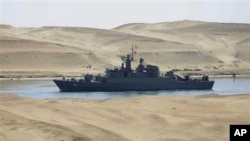The once frosty relations between Egypt and Iran have notably thawed in recent months. Contacts between the two nations have moved to the point where Iran's Deputy Foreign Minister will go soon to Cairo for talks, as well as planned meetings between Iran and Egypt's Foreign Ministers on the sidelines of the upcoming Non-Aligned Movement meeting.
It had not been seen for some three decades. On February 22, two Iranian naval ships passed through Egypt's Suez Canal into the Mediterranean Sea. By itself, it was an uneventful transit. But seen in a larger context, the passage represented renewed relations between the two nations.
In earlier times, Egypt and Iran were bonded by marriage. Iran's monarch, Shah Mohammed Reza Pahlavi, wed Egypt's Princess Fawzia Fuad in 1939. Though the couple later divorced, the two nations maintained diplomatic relations until Iran's 1979 Islamic Revolution.
Then, Tehran froze relations - after Egypt took in the Shah when he left Iran, and signed the Camp David peace accords with Israel.
The two nations remained distant through the 30-year rule of Egyptian President Hosni Mubarak, who left office in February after massive protests against him.
Since then, Egypt’s caretaker military government has begun a thaw with Iran. One aspect of that change is the recent Egyptian-brokered unity agreement between two warring Palestinian factions, Fatah, and Hamas - an agreement strongly backed by Iran. Potomac Institute analyst Tawfiq Hamid says the pact was meant to restore Egypt to a traditional leading mediation role, and reposition it away from its recent past.
"The Arabs and Palestinians considered that Egypt, during Mubarak's time, was pro-American, pro-Israel [and] anti-Palestinian. So, Egypt's position as the leading country in the Arab world was weakened. What happened when the [post-Mubarak] new regime or new system comes [came], they wanted to regain this leadership [role]. So, the fastest thing was to bring Hamas and Fatah [together]," he said.
In public, Egypt has characterized these overtures with Iran as moves toward normalization, and not toward embracement. Egyptian Foreign Ministry spokeswoman Mehna Bakhoum has said, "We look at Iran as a neighbor in the region that we should have normal relations with. Iran is not perceived as an enemy as it was under the previous [Mubarak] regime, and it is not perceived as a friend."
Warmer relations with Iran and Hamas, are not just foreign diplomatic initiatives for Egypt. The change also reflects how the once-banned Islamist group Muslim Brotherhood, which supports Hamas, has gained influence ahead of Egypt's upcoming elections, as RAND analyst Ali Reza Nader points out.
"Egypt and Hamas are, in some ways, becoming closer. Egypt is lifting the blockade on the Gaza Strip. The Muslim Brotherhood, which is linked to Hamas, [which] is an ally of Hamas in a lot of ways, is going to be a potentially big player in Egyptian politics," he said.
Other analysts say that while Cairo has warmed its relations with Iran, those moves have caused some other nations to react warily. And that, in turn, has prompted Egypt to make efforts to assure them, says Michele Dunne at the Carnegie Endowment.
"Egypt is also hearing, though, a lot of expressions of concern - from Saudi Arabia, from Israel, from the United States. And already, the Egyptian government has taken some steps to allay those concerns. The Egyptian prime minister went to Saudi Arabia not that long ago specifically to answer questions about this rapproachment with Iran, and how far it would go," he said.
But Egypt’s Foreign Minister, Dr. Nabil al-Arabi, in a recent interview with the Washington Post newspaper, insisted that his country’s thawing relations with Iran do not freeze out other nations, including the United States.












